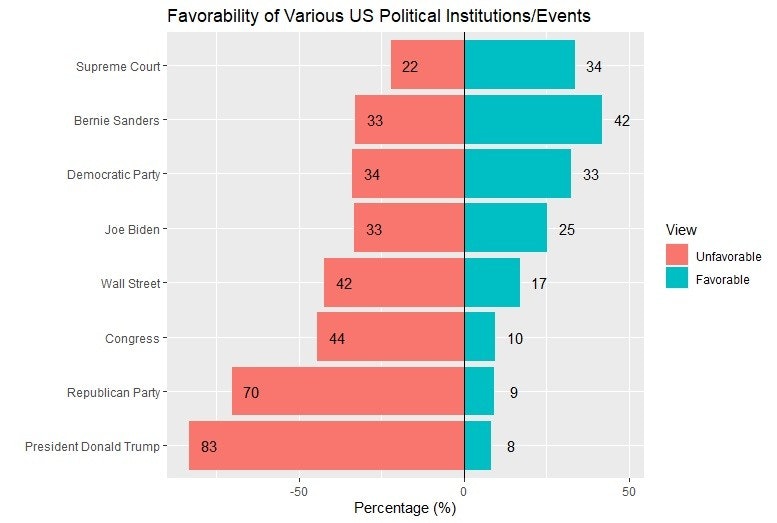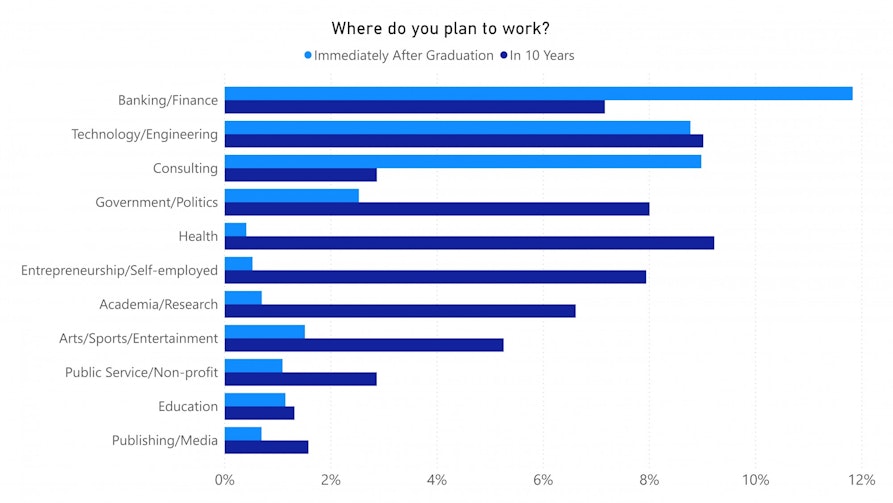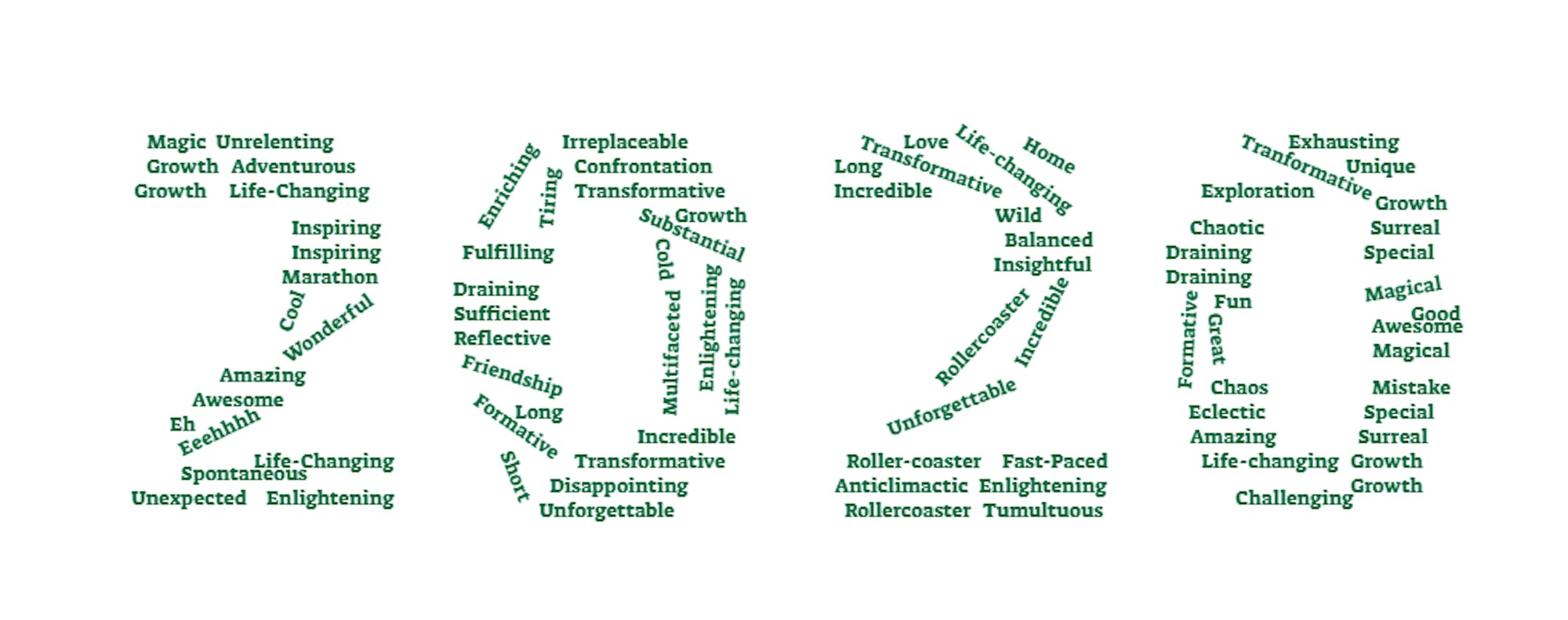This article is featured in the 2020 Commencement special issue.
For the fifth year in a row, The Dartmouth conducted a survey recording the opinions and experiences of the College’s graduating class. Since arriving at Dartmouth in 2016, the Class of 2020 has experienced substantial change and controversy, both nationally and at the College. The following four sections canvas the Class of 2020’s views on campus issues, student life, national politics and their futures.
Campus Issues

The Class of 2020 holds generally negative views of the College’s administration, though not quite as negative as previous classes. Fifty-four percent of the class has either an unfavorable or somewhat unfavorable view of the administration, down from 57 percent for the Class of 2019. On the other hand, 26 percent hold either a favorable or somewhat favorable view of the administration, up from only eight percent for the Class of 2019.
The Class of 2020 also has an improved view of College President Phil Hanlon relative to years past; 33 percent view him favorably, a significant increase from his 17 percent approval rating among the Class of 2019, while 46 percent view him unfavorably, up from 43 percent last year. Opinions on Dean of the College Kathryn Lively are almost evenly matched, with 39 percent viewing her favorably and 37 percent viewing her unfavorably.
The senior class is divided on specific college administrative policies. Views on the COVID-19 task force are evenly split, with 39 percent viewing it favorably versus 36 percent viewing it unfavorably. The Class of 2020 views the house community system generally unfavorably, at 31 percent favorable to 53 percent unfavorable. Views on the Greek system remain favorable, at 56-32, though this view is supported mostly by those who are members of Greek organizations. Among unaffiliated seniors, the Greek system is seen very negatively, with 72 percent viewing the system unfavorably and only 15 percent viewing it favorably.
The Class of 2020 remains satisfied overall with the College’s attention and resources dedicated to sexual violence prevention: 58 percent of students report being either extremely satisfied or somewhat satisfied, while the rest are extremely or somewhat dissatisfied. This result represents a significant drop from the Class of 2019 (67 percent satisfied to 33 percent dissatisfied) but is still an improvement over the Class of 2018 (44-39) and the Class of 2017 (35-45). Overall, female students (51-49) are more dissatisfied than male students (68-32).
The Class of 2020 perceives campus resources devoted toward mental health issues as somewhat inadequate. Overall, 44 percent are either extremely satisfied or somewhat satisfied, while the rest are either very or somewhat unsatisfied. This outcome represents a slight improvement over the Class of 2019 (41-59). Only nine percent of seniors reported being extremely satisfied with the College’s mental health resources.
On the topic of other important Dartmouth institutions, the Class of 2020 is firmly split on Dartmouth Dining Services, with 44 percent viewing it favorably versus 46 percent who view it unfavorably (up from 30-42 last year). Seniors view Safety and Security positively: 57 percent hold favorable views, compared to 29 percent with unfavorable views (up from 38-26 for the Class of 2019). Members of fraternities view S&S slightly more negatively (49-43) than members of sororities, co-ed fraternities and unaffiliated students (61-23).
The Dartmouth faculty has been near-universally appreciated by each graduating class, and the Class of 2020 is no exception: 94 percent view the College faculty favorably, compared to only three percent who view the faculty unfavorably; and the few negative responses were all only somewhat unfavorable.
Student Life
Academics continue to be a focal point for Dartmouth seniors. Ninety-one percent report that they are either extremely or somewhat satisfied with their Dartmouth education, slightly lower than the Class of 2019 and Class of 2018 (94 and 95 percent, respectively), but higher than the Class of 2017 (88 percent). When asked about factors that shaped their choice of major, 87 percent responded that academic interest was a very important factor, and 12 percent responded that it was a somewhat important factor — only one percent found academic interest to be unimportant for their major choice. The second most important factor was post-graduation career prospects, with 87 percent describing it as either very or somewhat important. Family pressure and easiness were both somewhat considered; 44 percent and 31 percent of seniors, respectively, found that these factors had some amount of influence over their major choice, though very few (nine percent and five percent, respectively) said that these factors were very important.
When asked about the importance of various aspects of the Dartmouth student experience, the emphasis on academics remains. 79 percent of seniors described academics as very important, and an additional 18 percent as important. Social life was a close second, with 95 percent responding that it is very or somewhat important, followed by extracurricular activities at 84 percent, Dartmouth traditions at 68 percent, Greek life at 66 percent and study abroad programs at 60 percent. Somewhat less important were paid employment at 58 percent, outdoor activities at 53 percent, varsity sports at 24 percent and politics at 24 percent. Less important still are religious and affinity groups at 17 percent and house communities at only 14 percent.
One Dartmouth tradition that routinely receives attention among the student body is the Dartmouth Seven, a set of seven locations on campus where students are challenged to have sex. Regardless, 73 percent of 2020 seniors say they did not complete any of the Dartmouth Seven, up from previous years (66 percent for the Classes of 2019 and 2017, 60 percent for the Class of 2018). The most popular of the Dartmouth Seven remain the Baker-Berry stacks, at 20 percent (down from 27 percent last year) and the Bema, at 19 percent. The steps of Dartmouth Hall, the Top of the Hop and the center of the Green fell in popularity, with each now reporting single-digit completion rates: at nine percent, eight percent and eight percent, respectively. Only five percent of seniors completed Hanlon’s lawn, while the 50-yard line remains the least popular of the Seven at four percent. As in past years, Greek-affiliated students tended to complete the Seven at a higher rate than unaffiliated students, at 38 percent for the affiliated and only seven percent for the unaffiliated. The Greek-affiliated maintain an affinity for Hanlon’s lawn, with eight percent completing it versus only one percent for the unaffiliated. Three percent of the Class of 2020 claim to have completed the entire Seven; all six such respondents to our survey are affiliated (three in fraternities, three in sororities).

The Class of 2020 is similar to the Class of 2019 in terms of romantic relationships. Thirty-three percent report that they did not date anyone at Dartmouth. The plurality, 41 percent, report dating one person; 16 percent report dating two people; eight percent report dating three people and two percent report dating four or more people. Similar to previous years, 43 percent of students report having engaged in sexual activity for the first time at Dartmouth, and a further 47 percent report having done so before Dartmouth; the remaining 10 percent report never having sex at all.
Regarding the use of alcoholic substances, 28 percent of students report drinking for the first time at Dartmouth, 66 percent of students report drinking before Dartmouth and the remaining 6 percent report having never drank at all. Thirty-five percent report using other drugs for the first time at Dartmouth, while 33 percent report having never used any other drugs or substances. Among those who did use drugs while at Dartmouth, the drug of choice tends to be marijuana, with 92 percent reporting having used it at some point during their time at college. Other drugs had much lower use rates among those who report using drugs: 49 percent report having used tobacco, 32 percent report having used cocaine, 29 percent report having used non-prescribed medications and 25 percent report having used LSD.
When asked which of five key Dartmouth events — First-Year Trips, Homecoming, Winter Carnival, Green Key and sophomore summer — were the most important for students, sophomore summer came in as the most important, with 82 percent reporting it was important or very important to them, compared to 69 percent for the Class of 2019. Green Key and Homecoming were tied for second at 73 percent, followed by First-Year Trips at 68 percent and Winter Carnival at 42 percent.
National Politics
The Class of 2020 is graduating amid a highly polarized political environment. During their freshman fall, they experienced a fierce 2016 presidential campaign. Other major events followed. The #MeToo movement rose, while controversies flared over immigration, foreign policy and the impeachment of President Donald Trump. Just as Hanover geared up for the 2020 presidential campaign, COVID-19 upended daily life across the world. Faced with a series of trying years, seniors are not optimistic about the future they face: over 70 percent thought that things in the country were “off on the wrong track,” while less than 10 percent thought things were “headed in the right direction.”

Overall, a plurality of seniors describe themselves as somewhat liberal, at 32 percent; 29 percent describe themselves as very liberal, while 20 percent describe themselves as moderate, 16 percent as somewhat conservative and 3 percent as very conservative. Dartmouth appears to have had a liberal influence on the Class of 2020; the number of seniors who identified as very liberal after their time at Dartmouth increased by five percentage points. There was also a small increase among those identifying as somewhat liberal, while the percentages of those identifying as moderate and somewhat or very conservative all decreased. These figures are in line with previous classes: for instance, the Class of 2018 saw a 14 percent increase in the very liberal category, while the Class of 2017 saw a 17 percent increase; the Class of 2019, on the other hand, saw a two percent decrease.

Given the majority liberal views of the class body, it is unsurprising that many right-wing institutions are generally viewed negatively. Eighty-three percent of the Class of 2020 have an unfavorable view of President Donald Trump, and 70 percent have an unfavorable view of the Republican Party. Despite leaning liberal, the Class of 2020 has mixed views on the Democratic Party: 33 percent view the Democratic Party favorably, 34 percent view the Democratic Party unfavorably and 33 percent are unsure. Among the three branches of government, students had the most positive view of the Supreme Court, which has a favorable-unfavorable split of 34-22. Congress is viewed much less favorably, with a 10-44 favorable-unfavorable split.
Despite the prevalence of banking and finance at Dartmouth, the Class of 2020 views Wall Street unfavorably: only 17 percent had a favorable view, while 42 percent had an unfavorable view. This continues the trend set by preceding classes: 53 percent of the Class of 2017 viewed Wall Street favorably, followed by 26 percent and 8 percent for the Class of 2018 and Class of 2019 respectively. However, among seniors who indicated they planned to work in banking or finance immediately post-graduation, 65 percent go into their jobs with a favorable view of Wall Street while only 10 percent go in with an unfavorable view. For seniors who indicated their plans in 10 years involved banking or finance, Wall Street’s favorability increases to 72 percent.
The final on-campus term for the Class of 2020 coincided with the beginning of the 2020 presidential primaries, with many Democratic and a few Republican candidates descending on campus to canvas for student votes in the New Hampshire primary. While the presumptive 2020 Democratic presidential nominee is Joe Biden, most of the Class of 2020 remain lukewarm on his candidacy, with only 25 percent indicating they have a favorable view of the former vice president, while 42 percent remain unsure and 33 percent have an unfavorable view. This trend seems to be driven by Biden’s lack of favorability among very and somewhat liberal students, of whom only 26 percent and 35 percent view him favorably, respectively. On the other hand, Biden’s favorability among moderate and somewhat conservative students is 27 percent and 9 percent, respectively. Democratic candidate Bernie Sanders, who received the second most Democratic primary votes nationally, was viewed much more favorably than Biden at 41 percent, compared to 33 percent unfavorable and 25 percent not sure. However, views on Sanders are much more polarized; while 79 and 44 percent of very and somewhat liberal students viewed him favorably, 71 percent of somewhat conservative students and nearly all very conservative students viewed him unfavorably.
As in previous years, most of the Class of 2020 indicate that their social networks generally align with their political views. Sixty-one percent say that all or most of their friends share the same political views that they do, while a further 33 percent say that some of their friends do. Those identifying as very or somewhat liberal are the most likely to report that all or most of their friends share their views. No conservatives report that all of their friends generally follow their political views — a reasonable finding given the majority liberal composition of the class body. Those identifying as moderate were most likely to say that only some or few of their friends shared their political views, with 57 percent and 18 percent saying so, respectively.
Post-Graduation Future

Of those living domestically post-graduation, the Class of 2020 will land in similar states to previous classes, with New York topping the list at 30 percent, followed by Massachusetts at 18 percent, and California at 13 percent. A much greater proportion — seven percent — of the Class of 2020 will be moving abroad, compared to just one percent for the class of 2019. Of those moving abroad, most are heading to Europe and Asia.
The majority of the Class of 2020 will enter work directly after graduation. Sixty-two percent say that they plan to work immediately after Dartmouth, while 27 percent will go to a medical, law or other graduate school. This is a significant change from the Class of 2019, in which a much higher 73 percent said that they planned to immediately enter the workforce after graduation while only 20 percent planned to attend graduate school. This drop in immediate workforce participation and increase in graduate school attendance may be due to opportunities lost as a result of COVID-19’s economic impacts. Indeed, 65 percent of 2020 seniors indicate that COVID-19 has affected their immediate post-graduation plans.
Among the different fields in which the Class of 2020 will be working immediately after graduation, banking and finance and consulting remain king: 30 percent will enter banking and finance, while another 23 percent will enter consulting. Other popular fields include technology and engineering and government and politics with 22 percent and six percent respectively. In terms of where the Class of 2020 hopes to end up 10 years from now, the fields become more balanced. Health and technology and engineering were the most popular fields at 15 percent each. Government and entrepreneurship were a close third and fourth at 13 percent each. Other popular fields were finance (12 percent), academia and research (11 percent) and entertainment (eight percent).
Overall, 28 percent of the Class of 2020 anticipate graduating with no debt, similar to the Class of 2019; of students graduating with debt, the median debt was $18,000, also similar to that of the Class of 2019. Families’ financial backgrounds make a big difference in this regard — 55 percent of students whose families make less than $50,000 will graduate with no debt, while 90 percent of students with family incomes of over $200,000 will graduate with no debt. Thirty-eight percent of seniors indicate that they expect to receive financial assistance from their parents following graduation, while the remaining 62 percent do not. Students from higher income backgrounds are much more likely to receive assistance: Only 16 percent of students with family incomes below $50,000 expect to receive assistance, compared to 37 percent of students with family incomes above $200,000. Interestingly, students with family incomes between $100,000 and $200,000 are the most likely to receive assistance from their families, with around 50 percent receiving assistance.
Methodology Notes:
From Wednesday, May 13 to Sunday, May 24, The Dartmouth fielded an online survey of Dartmouth senior students on their opinions and experiences at the school. The survey was sent out to 1,078 seniors through their school email addresses. 271 responses were recorded, resulting in a 25.1 percent response rate. Using administrative data from the College’s Office of Institutional Research, responses were weighted by gender, race/ethnicity, sexual orientation, Greek affiliation, and international student status. Weighting was done through iterative post-stratification (raking). Survey results have a margin of error +/- 5.15 percentage points.




